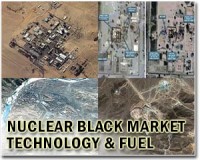 |
Moscow (AFP) Aug 27, 2010 It has been of one of Europe's worst nightmares: traffickers obtaining highly-radioactive materials on the loose in the former Soviet Union with the help of corrupt officials and passing them on to rogue groups looking to make a dirty bomb. The seizure this month of two kilogrammes of uranium in Moldova, an impoverished ex-Soviet nation bordering the EU member Romania, is a stark reminder of just how available and poorly guarded nuclear materials can be, analysts said. Moldovan police said this week they had seized a container with 1.8 kilogrammes of highly-radioactive Uranium-238 and arrested a group of suspected traffickers who had sought to sell it for nine million euros (11 million dollars). The United States has said it provided technical assistance to Moldova in the case, which the US State Department described as a "serious smuggling attempt". "Hundreds of thousands of tonnes of uranium lie in storage at industrial sites, one can take bagfuls of them," independent Russian military expert Pavel Felgenhauer told AFP. "There are people who try to sell them at a high price and most often they fall into the hands of security services," he said. The SBU security service in Ukraine, site of the 1986 Chernobyl nuclear disaster, have recently reported three cases of seizing radioactive materials. Nine people were arrested in March as they tried to sell 2.5 kilogrammes of uranium 235 and 238 and strontium in the eastern Donetsk and Lugansk regions, their radioactivity levels 100 times higher than acceptable norms. A container "with radioactive materials" was seized in December 2009 in the western region of Lviv, while in April that year, three Ukrainians were arrested in the nearby Ternopil region with four kilograms of plutonium which could be used to make a dirty bomb. The plutonium container's radiation levels were 250 times higher than the norm, officials said. In 2006, a suspected Russian trafficker was busted in Georgia as he attempted to sell "100 grams of 90-percent-enriched uranium" to a Georgian policeman who passed himself off as a member of a radical Islamic group. The case drew concern from the International Atomic Energy Agency. "The entire territory of the former Soviet Union is awash in radioactive material which was used in Soviet times for some 30 various ministries and services, in medicine or agriculture," independent Russian military expert Alexander Golts said. "Most often those materials are enriched to just three to five percent, which cannot be used to make nuclear weapons," he said. However the radioactive matter still presents a danger because potential traffickers while searching for clients may keep it in close proximity to people, for example in garages and unwitting passers-by can find themselves within 100 meters of the storage area, Golts said. As for highly-enriched substances, "they are under a very different level of protection," he said. The uranium intercepted in Moldova, Golts said, "could be used to make a dirty bomb that could cause contamination and panic." Levels of radiation emanating from the uranium were 60 times higher than is safe for humans, authorities said. Officials said Thursday talks were underway to send the uranium to Germany to pinpoint its origin and degree of enrichment because Moldova does not have laboratories to do the required analysis itself. But some experts are not convinced that the poorly guarded nuclear materials are dangerous, even if they end up in the wrong hands. "There is no real black market for nuclear materials, there is trafficking in radioactive substances," said Bruno Tertrais, expert at the Paris-based Foundation for Strategic Research (FRS). "In most cases of sales -- or attempted sales -- of nuclear substances, there are only a few grams being sold, too little by far to make a bomb," Tertrais said. A Vienna-based Western expert, speaking to AFP on condition of anonymity, said: "If the material is as reported, then there is no immediate danger from the material itself." "Of greater concern is whether this represents a larger smuggling effort and where the material came from." bur-neo-cal-as/sjw
Share This Article With Planet Earth
Related Links Learn about nuclear weapons doctrine and defense at SpaceWar.com Learn about missile defense at SpaceWar.com All about missiles at SpaceWar.com Learn about the Superpowers of the 21st Century at SpaceWar.com
 Moldova to send seized uranium to Germany: police
Moldova to send seized uranium to Germany: policeChisinau (AFP) Aug 26, 2010 Uranium seized from a suspected group of traffickers in the ex-Soviet state of Moldova will be sent to Germany to pinpoint its origin and degree of enrichment, officials said on Thursday. Authorities in Moldova said this week they had seized almost two kilogrammes (around four pounds) of the radioactive substance Uranium-238 from a suspected group of traffickers, including former interior mi ... read more |
|
| The content herein, unless otherwise known to be public domain, are Copyright 1995-2010 - SpaceDaily. AFP and UPI Wire Stories are copyright Agence France-Presse and United Press International. ESA Portal Reports are copyright European Space Agency. All NASA sourced material is public domain. Additional copyrights may apply in whole or part to other bona fide parties. Advertising does not imply endorsement,agreement or approval of any opinions, statements or information provided by SpaceDaily on any Web page published or hosted by SpaceDaily. Privacy Statement |